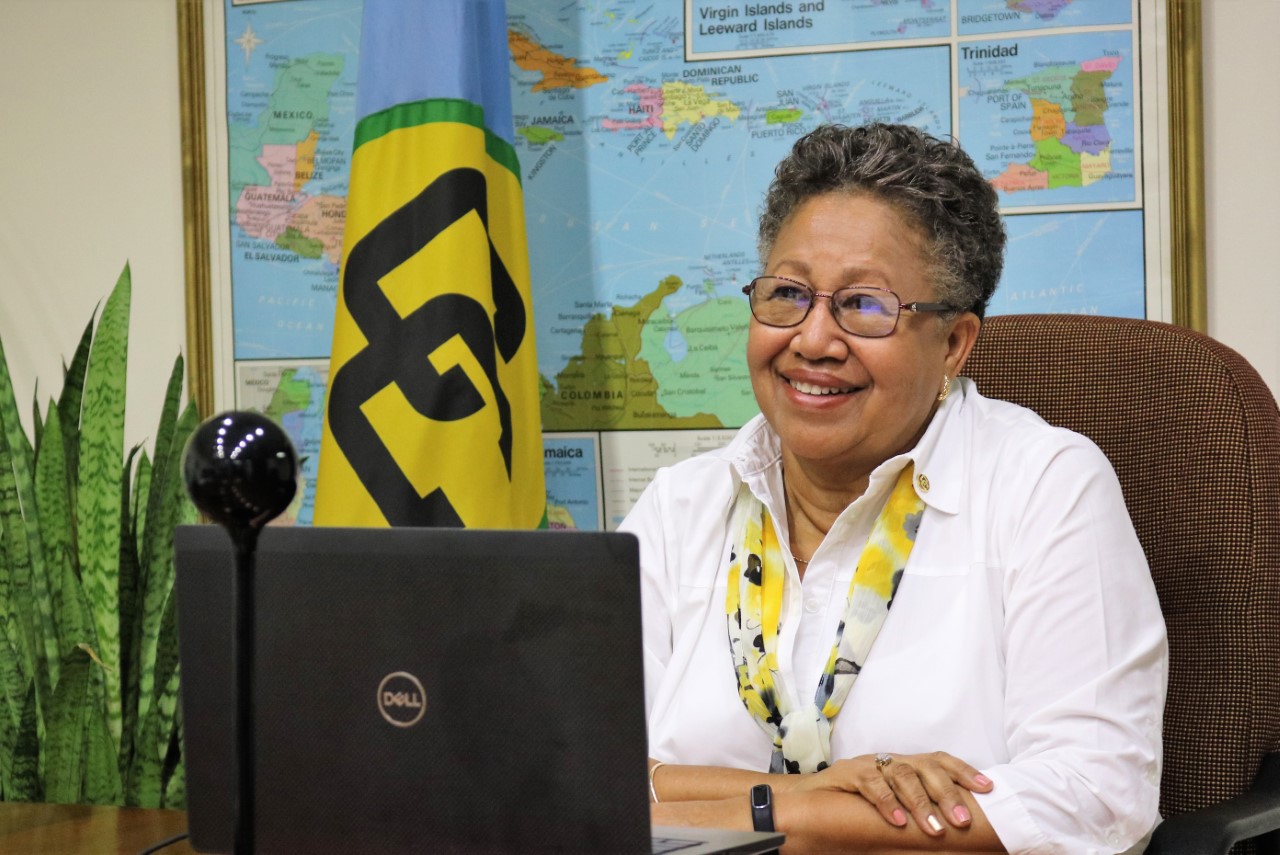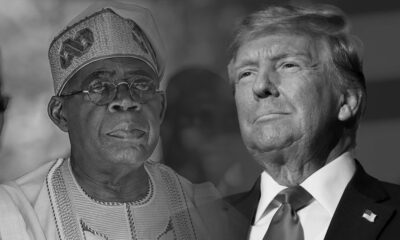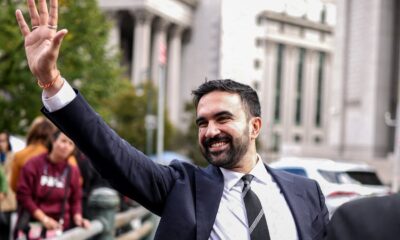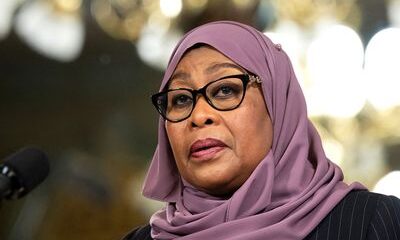News
As Kamala Harris Faces Political Turmoil, Will Hope Prevail Over Fear In The US Election?

As Kamala Harris Enters The US Election Danger Zone, We Are About To See If Hope Trumps Fear
BY ARTHUR SINODINOS
As an Australian onlooker, the pageantry of American politics – party conventions in particular – can seem like a spectacle compared with the austerity of Australian elections.
But after the DNC celebrations in Chicago wind down, the Democratic party is facing the hard reality of a serious fight ahead of November’s presidential election.
At this stage of the campaign, it’s better to be in Kamala Harris’ shoes than Donald Trump’s. But she has some work to do yet and is maybe a couple of points off a genuine lead.
She is now entering the danger zone. The home stretch traditionally kicks off on Labor Day on the first Monday in September, when everyone returns to work. Most voters are locked into their choice by now but must be motivated to stay engaged and cast their vote. Ballot papers will start going out soon in some states.
The few undecideds now start to focus on the campaign. By this stage, candidates should have honed their messages down to a few key points that they will repeat ad nauseam until election day. By the end of it, the candidates will have very little fuel left in the tank.
The major events to come are the debate(s), where a misstep could cost the election. If Trump behaves himself and sticks to the key issues (immigration and the economy) he is positioned to win the debates and possibly the election. The pressure on Harris is to show she can go toe to toe with Trump and is in command of not only broad themes but policy, without getting lost in the weeds.
Trump has struggled to get his line and length on Harris. He is still mourning the loss of Joe Biden. He went through a similar grieving process in 2020 when Covid-19 derailed his election campaign. Trump began 2020 confident that the strong economy and incumbency would result in a comfortable reelection, but Covid completely changed the election landscape. He struggled to adjust his message, veering between Churchillian statesmanship and partisan brawling. He took over Vice President Pence’s daily briefings, which were rating highly, and made the election a referendum on himself.
Biden, meanwhile, kept to his basement and pounded out messages that highlighted Trump’s negatives. He detached enough non-college-educated white voters to swing the election. That was the calculation behind backing Biden in 2020. In this election, Biden became a handbrake on voter enthusiasm, so the Democrats cancelled him. Trump underestimated the ruthlessness of the Democrats and Biden’s party loyalty; he is above all an institutionalist, the quintessential insider.
Read also : The Potential Return of Donald Trump and Its Global Impact
Trump presents himself as the outsider, seeking to appeal to those let down by the cosy Washington insiders looking after themselves and Wall Street but not main street. Insiders are cosmopolitans and globalists; he is America First.
Trump is simultaneously courting the big end of town and the libertarians in Big Tech with promises of lower taxes and less regulation. Tech bros such as Elon Musk and Peter Thiel also see themselves as outsiders, breaking through the business establishment and setting their own rules. Trump is OK with that if they fund him and provide support in the media.
A strong suit for Trump is the economy, which did well during his tenure, driven by tax cuts and a burgeoning deficit. Biden’s strong economy has been undermined by inflation stoked by supply side shortages and continued growth in government spending. Trump’s policy proposals for higher tariffs will add to costs as will the desire to artificially lower the dollar, impacting interest rates and undermining market confidence. The Republicans cannot agree on a plan to rein in the fiscal deficit, with defence spending set to go
Harris is turning the Republican mantra of freedom on its head – freedom over your own body if you are a woman, freedom from gun violence and the freedom to get ahead. She has reenergised young people and women generally. She is leaning into the changing face of America, positioning Trump as yesterday’s man
higher and Trump having promised tax cuts all round and ruled out cuts to Medicare and social security.
Trump’s other strong suit is immigration, which has surged in the last four years. His attacks on immigration are also a proxy for how quickly America is changing in demography, and racial and ethnic complexion. This is linked to fears about safety and security in sections of the population. This was exemplified by a recent Trump ad that contrasted a traditional American house with a flag out the front, next to a hellscape of a neighbourhood overrun by dark-skinned immigrants and intruders. This is not a time for subtlety.
But Harris has transformed the race. She is proof that, above all, politicians are purveyors of hope. That was Michelle Obama’s message to the Democrat faithful: “The contagious power of hope.”
Harris is turning the Republican mantra of freedom on its head – freedom over your own body if you are a woman, freedom from gun violence and the freedom to get ahead. She has reenergised young people and women generally. She is leaning into the changing face of America, positioning Trump as yesterday’s man.
She remains a policy chameleon, straddling the divide between moderate and progressive Democrats, and deftly distancing herself from some Biden-era policies including the self-described broken immigration system. She has junked inconvenient policy positions. She no longer supports single payer government-run healthcare, for example.
The Trump team is reprising previous policy positions to define her as a far-left candidate. This may stick if Harris is unable to define herself, although the Trump/Vance team has shifted positions over time, too.
Democrat strategists are wary of tying her down with too many details – that is for after the election. Her positions now are meant to paint a picture of her as the anti-Trump while neutralising his populist themes. She matched his promise not to tax tips (important to hospitality workers in Nevada). Her major economic speech last week was a populist feast, dealing with inflation by going after price gouging by corporations and offering a housing grant program to the middle class (proxy for the aspirational working class).
If Trump continues to bait her by targeting personality rather than policy, she may just get away with policy lite.
We are about to see if hope trumps fear.
Arthur Sinodinos is a former Australian ambassador to the US. He is the partner and chair of The Asia Group’s Australia practice and was a former minister for industry, innovation and science
News
CARICOM Seeks Global Support to Tackle Soaring Insurance Costs in Tourism Sector

CARICOM Seeks Global Support to Tackle Soaring Insurance Costs in Tourism Sector
The Secretary-General of the Caribbean Community (CARICOM), Dr. Carla Barnett, has urged the international community to work collectively to address the surging cost of insurance in the tourism sector of Small Island Developing States (SIDS), warning that the trend threatens economic stability and investment flow in the region.
Dr. Barnett made the call during a high-level panel session at the 6th Global Services Forum, held as part of the 16th United Nations Conference on Trade and Development (UNCTAD16).
The event, themed “Services: A New Frontier of Economic Transformation for Equitable, Inclusive and Sustainable Development,” explored how the global services sector can drive growth, employment, and trade competitiveness.
According to her, CARICOM’s service-dependent economies remain highly exposed to climate-induced disruptions, with rising insurance premiums compounding the challenges faced by operators in the tourism industry, a key revenue earner for the region.
“The cost of insurance is rising significantly for older properties [in the tourism sector], and accessing insurance for new investments is almost impossible,” Dr. Barnett lamented. “This is something we need to work with the global community to address.”
The CARICOM Secretary-General noted that the services sector contributes a substantial share of the region’s Gross Domestic Product (GDP), accounting for up to 75 percent in countries such as The Bahamas, Saint Lucia, and Barbados. Even in more diversified economies like Trinidad and Tobago and Jamaica, she said, services still make up around 60 percent of total GDP.
Dr. Barnett stressed that the sector’s heavy reliance on tourism makes it particularly vulnerable to natural disasters, adding that frequent and intense weather events are heightening investor anxiety.
“When weather systems like Hurricane Melissa threaten, stakeholders in the tourism industry get really frightened,” she said. “We do the best we can, but we prepare for the worst.”
She emphasised that global cooperation remains vital in helping CARICOM member states close economic gaps and strengthen resilience against external shocks.
She pointed to ongoing collaborations with institutions such as UNCTAD, the World Trade Organization (WTO), and international development banks as pivotal in advancing the region’s capacity to withstand future challenges.
Highlighting one example, Dr. Barnett referenced the Trade in Services project, a partnership between UNCTAD and CARICOM aimed at enhancing data collection and analysis to inform evidence-based policymaking and promote sustainable growth.
She noted that CARICOM’s services industry extends beyond tourism to include financial services, information and communication technology (ICT), professional services, entertainment, culture, and sports, all of which possess immense potential for expansion if adequately supported.
The Secretary-General reiterated that global support, especially through concessional financing, risk mitigation mechanisms, and climate adaptation initiatives is essential to unlock the full value of the region’s service industries and cushion them against climate-related shocks.
“We need to build resilience and create an enabling environment that protects our service sectors from the increasing costs and uncertainties brought by climate change,” Dr. Barnett said.
The Global Services Forum underscored that services now account for nearly two-thirds of global GDP, affirming the sector’s growing role as a driver of equitable and inclusive development.
News
Samia Suluhu Wins Re-election in Tanzania Amid Violence, Opposition Outcry

Samia Suluhu Wins Re-election in Tanzania Amid Violence, Opposition Outcry
Tanzanian President Samia Suluhu Hassan has secured another term in office with an overwhelming 98 per cent of the vote, following an election marred by deadly violence, mass protests, and opposition allegations of widespread fraud.
The country’s electoral commission announced the results on Saturday, declaring the incumbent victorious after Wednesday’s poll, which was conducted under tense conditions marked by an internet blackout and the exclusion of key opposition figures.
According to official figures, Samia, who leads the long-ruling Chama Cha Mapinduzi (CCM) party, polled 97.66 per cent of the total votes cast, with a voter turnout put at nearly 87 per cent.
The opposition, however, has rejected the results, describing the process as “a mockery of democracy.”
The declaration sparked widespread unrest across major cities, particularly in Dar es Salaam and Arusha, where protesters clashed with police and soldiers.
Eyewitnesses reported scenes of chaos as demonstrators tore down campaign posters and burned tyres, chanting slogans demanding justice and a rerun of the election.
Opposition sources and human rights groups have painted a grim picture of the situation.
The Chadema Party claimed that about 700 people have been killed in the crackdown, while a diplomatic source quoted by the BBC suggested at least 500 confirmed fatalities.
However, the government has downplayed the scale of the violence. Foreign Minister Mahmoud Kombo Thabit described the incidents as “isolated disturbances,” insisting that security forces acted “swiftly and decisively” to maintain peace. Authorities have since extended a national curfew, citing the need to “restore order and protect lives.”
Critics argue that the election outcome was all but predetermined. The two main opposition figures, Tundu Lissu, who is facing treason charges, and Luhaga Mpina of the ACT-Wazalendo Party, who was disqualified on technical grounds were prevented from contesting.
Their exclusion effectively handed the CCM an open field, with only minor candidates permitted to run.
“The results are a complete fabrication,” a Chadema spokesperson said. “This election was neither free nor fair. It was conducted under intimidation, fear, and bloodshed.”
The developments in Tanzania have drawn widespread international condemnation.
UN Secretary-General Antonio Guterres expressed concern over the situation, urging all parties to prevent further escalation and to respect human rights.
In a joint statement, the governments of the United Kingdom, Canada, and Norway cited “credible reports of a large number of fatalities and significant injuries,” calling for an independent investigation into the violence.
Rights group Amnesty International also condemned the election process, accusing the government of orchestrating a “wave of terror” that included arbitrary arrests, torture, and enforced disappearances of opposition supporters claims the authorities have strongly denied.
Samia Praises Security Forces, Labels Protesters ‘Unpatriotic’
In her victory speech, President Samia commended security agencies for “protecting national peace and stability” during the polls.
She described protesters as “unpatriotic elements bent on destabilising the nation.”
“Tanzania has once again proven its commitment to peace and democracy,” she said. “The will of the people has spoken, and no one will be allowed to undermine it.”
Her remarks have drawn criticism from civil society groups, who argue that the government’s heavy-handed response has eroded public trust and pushed the country toward deeper political uncertainty.
President Samia, who first assumed office in 2021 following the death of John Magufuli, was initially praised for promising to open up civic space and reverse some of her predecessor’s authoritarian policies.
However, in recent years, her administration has faced mounting criticism over its handling of dissent, with growing reports of intimidation, media restrictions, and arrests of opposition leaders.
Analysts say the latest election outcome cements the CCM’s unbroken dominance since independence but raises questions about the country’s democratic trajectory.
“Tanzania is at a crossroads,” said one political analyst in Dar es Salaam. “What we are witnessing is the consolidation of power under a system that leaves little room for genuine opposition or accountability.”
With her re-election now confirmed, President Samia faces the dual challenge of restoring confidence at home and repairing Tanzania’s image abroad.
As curfews remain in place and communication networks slowly return, the scale of the violence and the true death toll may only become clearer in the coming days.
News
Obama Storms Virginia, New Jersey in Last-Minute Push for Democrats

Obama Storms Virginia, New Jersey in Last-Minute Push for Democrats
Former U.S. President Barack Obama has returned to the campaign trail, lending his political weight to two crucial Democratic gubernatorial candidates in Virginia and New Jersey as both states prepare to head to the polls on Tuesday.
Obama, one of the Democratic Party’s most influential voices, is set to headline rallies in Norfolk, Virginia, and Newark, New Jersey, this weekend in support of Abigail Spanberger and Mikie Sherrill, the party’s flagbearers in the high-stakes elections.
The two races are widely viewed as an early test of the national political mood and a referendum on the country’s direction under Donald Trump’s presidency.
In Virginia, Obama will campaign alongside former congresswoman Abigail Spanberger, who is locked in a tight race against Republican Lieutenant Governor Winsome Earle-Sears.
Later in the day, he will appear in Newark to drum up support for Representative Mikie Sherrill, who faces a stiff challenge from Republican Jack Ciattarelli, a former state lawmaker.
Party insiders say the choice of venues both cities with significant Black populations is deliberate, as Obama’s enduring popularity among minority voters remains one of the Democrats’ strongest mobilization tools.
A senior Democratic strategist said Obama’s presence is expected to “inject late momentum into both campaigns,” noting that voter turnout in urban areas could be decisive.
The rallies mark the climax of a weeklong show of force by the Democratic establishment. Several high-profile governors, many seen as potential 2028 presidential hopefuls have already joined the campaign trail to support Spanberger and Sherrill.
Among them are Kentucky Governor Andy Beshear, Maryland’s Wes Moore, Illinois Governor JB Pritzker, Pennsylvania’s Josh Shapiro, and Michigan’s Gretchen Whitmer.
Former Transportation Secretary Pete Buttigieg also campaigned with Sherrill earlier in the week, using the event to criticise the Trump administration’s cancellation of the Gateway Tunnel rail project, a major infrastructure initiative that would have improved transit across the New York–New Jersey corridor.
While both Virginia and New Jersey are traditionally Democratic-leaning, analysts warn that complacency could be costly.
In 2021, Republicans stunned observers when Glenn Youngkin won the Virginia governorship, signalling conservative gains in suburban areas once considered Democratic strongholds.
In New Jersey, Sherrill’s lead has been consistent but narrow. Her opponent, Ciattarelli, has downplayed the impact of Obama’s visit, insisting that his campaign’s strength lies in “grassroots connections with ordinary voters.”
“This is what I refer to as the choreography of campaigns,” Ciattarelli told reporters after casting his vote on Friday. “Our focus is on the people, not on celebrity endorsements.”
The twin elections are being closely monitored in Washington and beyond. Political observers describe them as a barometer of the public mood ahead of the 2026 midterm elections, a critical period that could reshape the balance of power in Congress.
If Democrats secure victories in both states, it could provide a morale boost and signal renewed voter confidence in the party’s leadership.
However, any upset would likely embolden Republicans and fuel debate over Democratic strategy heading into the next national election cycle.
For Obama, this weekend’s appearances mark a return to familiar territory: rallying the Democratic base with his trademark blend of optimism and urgency.
At a private event ahead of the rallies, the former president reportedly told supporters that the upcoming elections are about “keeping the country on the path of inclusion, fairness, and forward progress.”
“Elections are about the future,” Obama said. “And the future we want is one where every American feels seen, valued, and protected.”
-

 News7 days ago
News7 days agoTrump Threatens Military Action in Nigeria Over Alleged Christian Killings
-

 Analysis7 days ago
Analysis7 days agoNow That Tinubu Has Listened … by Alabidun Shuaib AbdulRahman
-

 News7 days ago
News7 days agoMamdani Poised to Make History as New York’s Youngest, First Muslim Mayor
-

 Analysis6 days ago
Analysis6 days agoJustice for Ochanya Ogbanje, by Boniface Ihiasota
-

 News6 days ago
News6 days agoCARICOM Seeks Global Support to Tackle Soaring Insurance Costs in Tourism Sector
-

 Business7 days ago
Business7 days agoU.S. Air Travel in Crisis as 13,000 Air Traffic Controllers Work Without Pay Amid Government Shutdown













